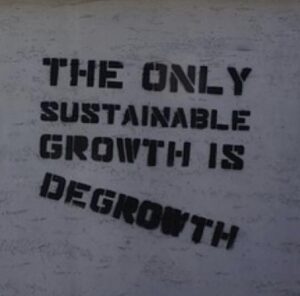Recently I wrote about 2 words that have negative implications to many people, “population” and “overpopulation”. I’m introducing a word that will be new to many people so, fortunately, it has few adverse meanings.
What does “degrowth” mean? Being new, it has been used in a variety of ways. Wikipedia defines it as “…critical of the concept of growth in gross domestic product as a measure of human and economic development”. The website degrowth.info writes: “Degrowth critiques the global capitalist system which pursues economic growth at all costs, causing human exploitation and environmental destruction.” To me, the most important aspect of degrowth is decreasing human population voluntarily. Unfortunately, one source seems to have another idea.
I have subscribed to Matt Orsagh’s blog “Degrowth is the Answer” for months, so when he published “By Disaster or Design”, I read it and found it rich in economic discussion—an area where I am poor. I was surprised to find little support for slowing population growth. Here is a quote from that white paper; “Degrowth is focused on living within planetary boundaries, using policy, cultural changes, and green energy to get there…. Population control is not a goal of degrowth.”
I agree about population control. I believe that the only way that population should and can be reduced humanely is by removing barriers to access of voluntary, effective family planning. The control must be by the individual, not any outside or governmental entity.
We do agree wholeheartedly on one point—humanity needs to stop living beyond our planet’s means. To illustrate how we are abusing our planet’s resources, Orsagh uses the planetary boundaries model generated by the Stockholm Resilience Centre. It shows that humanity has already pushed through six of the nine planetary boundaries. Unfortunately, the Stockholm group does not focus on slowing population growth, but rather on actions such as wealth redistribution and degrowth.
Although the majority of economists assume that growth is beneficial and will continue indefinitely, a few are more rational. The Center for the Advancement of the Steady State Economy (CASSE) has been around longer than proponents of degrowth, with a more modest goal—to arrest our economy’s growth. CASSE aims for a stable population, and stable consumption of energy and materials at sustainable levels. With these stabilized, we would be much closer to sustainability.
Both CASSE and Orsagh seem to rely on fear for motivation. They warn us what will happen if we don’t slow growth. Furthermore, I feel that neither has a realistic path to stop growth. How can we persuade politicians to support policies to slow expanding the economy, when they are getting rich from the status quo?
Growthbusters, on the other hand, relies on humor as well as thoughtful concern about our current pro-growth economy. It recognizes the importance of contracting both our economy and our population. Its originator, Dave Gardner, also has a serious side that includes running for city council and co-hosting a series of podcasts. Please check out his short videos on YouTube for some laughs.
For a sobering view of out future without degrowth, I suggest the recent article “Post-growth: the science of wellbeing within planetary boundaries”. The first sentence of its abstract reads: “There are increasing concerns that continued economic growth in high-income countries might not be environmentally sustainable, socially beneficial, or economically achievable.”
How do we achieve degrowth? Orsagh wrote: “Degrowth is not going to come from the top. It will have to come from the grassroots, and that means people sharing these ideas, talking to other people, and slowly, over time building to a critical mass that those in power can’t ignore.” I believe that the best way to promote degrowth is by taking away barriers to voluntary family planning.
©Richard Grossman MD, 2025
